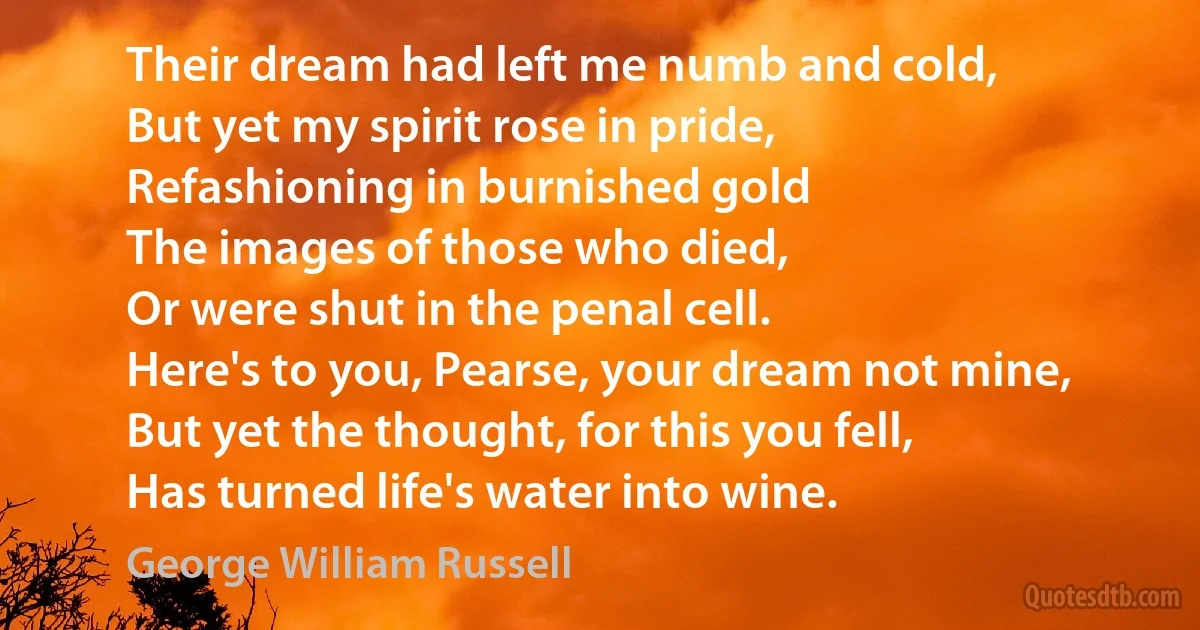Wine Quotes - page 38
No lesson seems to be so deeply inculcated by the experience of life as that you should never trust experts. If you believe doctors, nothing is wholesome: if you believe the theologians, nothing is innocent: if you believe the soldiers, nothing is safe. They all require their strong wine diluted by a very large admixture of insipid common sense.

Robert Gascoyne-Cecil, 3rd Marquess of Salisbury
Isolated here in the North, planted long ago by a Roman pilgrim, a chestnut grew, strong and solitary, by the colonnade of rounded double arches at the entrance to the cloister of Mariabronn: a noble, vigorous tree, the sweep of its foliage drooping tenderly, facing the winds in bold and quiet assurance; so tardy in spring that when all glowed green around it and even the cloister nut trees wore their russet, it awaited the shortest nights to thrust forth, through little tufts of leaves, the dim exotic rays of its blossom, and in October, after wine and harvests had long been gathered, let drop the prickly fruits from its yellowing crown... The lovely tree, aloof and tender, shadowed the entrance to the cloister, a delicate, shuddering guest from a warmer clime, secretly akin to the slender double columns of the gateway, the pillars and mouldings of the window arches, loved by all Latins and Italians, gaped at, as a stranger, by the inhabitants. Ch. I.

Hermann Hesse
He had discovered that a cubic inch of marble consisted of about half its weight of pure lime, and as much air as would fill a vessel holding six wine gallons. ...What could be more singular than to find so subtle a substance as air existing in the form of a hard stone, and its presence accompanied by such a change in the properties of that stone? ... It is surely a dull mind that will not be animated by such a prospect.

Joseph Black
During the war of 1914-18 the English working class were in contact with foreigners to an extent that is rarely possible. The sole result was that they brought back a hatred of all Europeans, except the Germans, whose courage they admired. In four years on French soil they did not even acquire a liking for wine.

George Orwell
Burchill divides up the chosen people into Good Jews (hardliners, Israelites) and Bad Jews (liberal Jews) with the enthusiasm of an antisemite. Hilariously, she sets herself up as the Jewishness Police, railing against Jews who are not Jewish enough; and one of those, it turns out, is her local rabbi, Elli Tikvah Sarah. Burchill rails against the rabbi for, in this order: ignoring a bottle of champagne Burchill gave her in favour of elderflower wine made by the rabbi's girlfriend; "canoodling" with said girlfriend ("a Sapphic free-for-all", sneers the heretofore not exactly prudish Burchill), and advocating a dialogue with Islam.
Burchill doesn't include this in the book but, according to Rabbi Sarah, Burchill emailed the synagogue's congregants railing that "your rabbi respects PIG ISLAM". Aww, being used as a launchpad for a British columnist's racism – we're living in the Promised Land now, fellow Jews!

Julie Burchill
China is vague and immense where the nine rivers pour.
The horizon is a deep line threading north and south.
Blue haze and rain.
Hills like a snake or tortoise guard the river.The yellow crane is gone. Where?
Now this tower and region are for the wanderer.
1drink wine to the bubbling water - the heroes are gone.
Like a tidal wave a wonder rises in my heart.

Mao Zedong
I must tell you, sir, that yesterday the pharisaical devil was let loose, cursed me and my little book, and condemned the book to the fire. He charged me with shocking vices; with being a scorner of both Church and Sacraments, and with getting drunk daily on brandy, wine, and beer; all of which is untrue; while he himself is a drunken man.

Jakob Böhme
In his curious tract on Stereometry, published in 1615, Kepler made some advances in the doctrine of infinitesimals. Prompted to the task by a dispute with the seller of some casks of wine, he studied the measurement of solids formed by the revolution of a curve round any line whatever. In solving some of the simplest of these problems, he conceived a circle to be formed of an infinite number of triangles having all their vertices in the centre, and their infinitely small bases in the circumference of the circle, and by thus rendering familiar the idea of quantities infinitely great and infinitely small, he gave an impulse to this branch of mathematics. The failure of Kepler, too, in solving some of the more difficult of the problems which he himself proposed roused the attention of geometers, and seems particularly to have attracted the notice of Cavaleri.

Johannes Kepler


